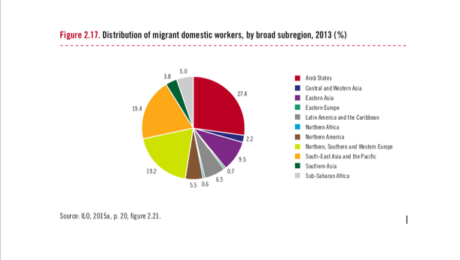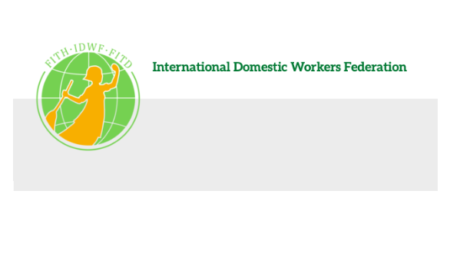Invisible Frontliners: Migrant Care Workers in the Time of COVID-19
The Covid-19 pandemic has exposed fault lines in national healthcare and social protection systems that have made many countries – developed as well as developing – unable to quickly and efficiently deal with this new health crisis and its disastrous consequences on jobs and incomes. One segment of the population in Europe, North America and Asia’s wealthy countries is falling deep into these crevasses, and, sadly, is missing from national debates and policy agendas on the Covid-19 crisis. This group comprises the migrant care workers, especially those who provide care services to elderly, frail, and dependent persons in caregiving institutions and private homes.
Overwhelmingly consisting of women, these migrant workers (along with minority ethnic groups) are the backbone of the childcare, elderly care and long-term care sectors. They include “nannies”, “home carers”, “social care workers”, “collaboratrice familiar”, nurses and nursing aides, among others. According to the European Commission, workers engaged in “personal and household services” are mostly women, working mainly part-time and often of migrant background. ILO estimates that globally there are 11.5 million international migrant domestic workers, and nearly 80 percent of them are employed in OECD countries. According to data on OECD countries, in 2012–13 28 percent of home-based caregivers were foreign-born.
Increasingly restrictive immigration controls in high-income countries in the past two decades have channelled a disproportionate share of immigrants into jobs in informal long-term and home-based care where wages are low, work hours are long and unpredictable, protection from abuse may be missing, and workload is heavy.[1] These are jobs that can easily be concealed from government surveillance. In the US, UK and Canada, for example, most foreign-born care workers enter the country through non-employment routes, such as family unification, refugee protection and asylum programs, and are on student, tourist and working holiday visas. An unknown number of them work clandestinely.
These migrant care workers are particularly vulnerable in the current Covid-19 pandemic for several reasons. First, eldercare homes across Europe and North America have emerged as hotspots of COVID-19 cases and account for a disproportionate share of deaths related to COVID-19. Data collated by the International Long-term Care Policy Network (hosted by the London School of Economics) across five European countries suggest that between 42 and 57 percent of deaths related to COVID-19 have so far occurred in nursing homes.
Secondly, the disproportionate and increasing share of COVID-19 deaths in eldercare homes is not simply due to the residents’ higher vulnerability due to their age and health conditions. It is also because many caregivers in these homes lack access to PPEs and are often overworked in often understaffed facilities. Being poorly paid, some of them also work in multiple facilities just to make ends meet. Poor working conditions of migrant workers in long-term and eldercare homes have been well documented by several studies – conditions regarding their work hours, allocation of responsibilities for diverse tasks and more difficult patients, low pay rates, and no overtime compensation.
Thirdly, the hundreds of thousands of migrant domestic workers who work in private homes are in the frontlines of keeping homes safe and clean. They face multiple risks as a result of the pandemic – health risks, more demands on their time, and income loss. According to the International Domestic Workers Federation, domestic workers worldwide have reported many concerns since the global pandemic began. With entire families staying home all day due to quarantine measures, domestic workers face heavier demands of cooking, cleaning, and caregiving without the benefit of additional pay for longer hours—and because of mobility restrictions, many cannot leave the homes where they work.
Finally, many care workers who have irregular migrant and/or employment status under informal arrangements have no access to unemployment and health insurance benefits, relief packages or financial aid related to COVID-19. This has been recently documented by the National Domestic Workers Alliance and the Pennsylvania Domestic Workers Alliance (networks representing nannies, caregivers and domestic workers in the US), the European Trade Union, and the Kanlungan Filipino Consortium in the UK. Those who fall ill prefer not to go to hospitals until it is too late for fear of being reported to migration authorities and because they do not have health insurance. These care frontliners are largely invisible and likely to suffer in silence
Contributed by Amy King-Dejardin, Former senior staff of ILO (Geneva) and author of the 2018 ILO report, “The Social Construction of Migrant Care Work.”
[1] King-Dejardin, A., 2019, The social construction of migrant care work, Geneva: ILO https://www.ilo.org/global/topics/labour-migration/publications/WCMS_674622/lang–en/index.htm
*Learn more about the ILO Bureau of Gender Equality here
- Published in COVID 19, Migrant Care Workers
Domestic and Care Workers Under COVID-19
By definition, domestic workers are an essential part of the global care workforce. According to the ILO, there are 70 million domestic workers over the age of 15 working directly for private households. They therefore make up roughly 22.7% of the global care workforce (which number 308,6 million).[1] Since its foundation in 2013, the International Domestic Workers Federation (IDWF) has worked with global unions and key audiences with the aim of including home care workers into the global agenda on “care” and to fight for the improvement of their living and working conditions.
Work in the care sector changes rapidly due to aging populations in the west and the more industrialized part of Asia. Financial demands on families who rely on unpaid care work, or the reliance by governments on private and not-for-profit sectors to play an increasing role in providing services. In Asia, most governments deny labour rights and working conditions, particularly for migrant workers, In the west, there is an increasing number of undocumented migrant domestic workers and they do not enjoy labour rights protection due to their vulnerable status. In recognition of the challenges in care work, in 2018 the IDWF Congress adopted two Resolutions (No. 3 & 4) to guide the Federation’s work and address global demands on developing inclusive care systems, special protection programs, and special attention to undocumented and migrant worker’s needs.
The new coronavirus pandemic has impacted all regions for more than three months. Domestic, household and care workers are on the frontlines in keeping families and communities healthy, but they are also most at risk. COVID19 has increased the vulnerability of the sector, which is already and broadly characterized by lack of protections, social security or recognition in many places of the world.
The IDWF consists of 74 affiliates in 57 countries, representing almost 600,000 domestic workers. Since the pandemic began, the IDWF has been actively engaging with affiliates in all regions to monitor the situation on the ground. In many countries, workers are experiencing a substantial increase in workload to ensure cleanliness and hygiene; or in taking care of older people and people with existing medical conditions.
The most critical issues identified:
– Domestic and care workers, especially the live-out/ part time are the most vulnerable group. They cannot move around and lose their jobs due to the lockdowns and social distancing rules, or their employers no longer call them in to work. Many have endured this situation for several weeks while others are losing their jobs with no prospects of finding new sources of income.
-Without income, migrant workers are especially vulnerable as they try to survive in the destination countries. In many countries, migrant workers are not eligible for medical services and hence do not get COVID-19 tests, places for quarantine or medical treatment when needed.
-Workers from rural areas working in the cities, cannot return to their families, or access relief packages provided by local governments.
-The lack of medical and social protections benefits renders domestic and care workers unprotected even when they are sick or need to be quarantined with no remuneration. IDWF and Affiliates are monitoring the mortality rates of members, a difficult task as many governments do not test or report incidents.
-Despite the essential work, domestic and care workers face increasing discrimination during the pandemic. Many workers report for being blamed for bringing the virus into their employers’ homes.
-The ability of domestic workers unions to keep their offices functioning is also compromised during quarantine or semi-quarantine time. Many unions are able to pay for the basic services and provide essential support (i.e. information, food baskets, training) from income previously generated. It is essential that union offices keep operating and maintaining their services for a range of situations that go from unfair dismissals to gender based violence.
In this situation, most organizations have shifted or stopped normal activities. With exception to those in North America and Europe, most organizations are struggling to find ways and means to address emergencies. Some countries have included domestic workers in their relief programs while others have joined hands with allies to demand governments to give out wages /cash, food, masks, sanitizers, places for quarantine. As the pandemic continues, so will the crisis on the ground.
Based on its assessment, the IDWF will continue to do research and collect data to inform advocacy. The IDWF will also set up a solidarity fund to address some of the most critical needs to enable domestic/care workers –and their families– to cope and survive with COVID-19.
[1] ILO (2018), Geneva. Care Work and Care Jobs For the Future of Decent Work.
Contributed by Sofia Trevino, Sustainability Advisor for International Domestic Workers Federation (IDWF) and the Project Manager for Women in Informal Employment Globalizing and Organizing (WIEGO)
Relevant Links:
IDWF: Decent work for Domestic Workers: Eight Good Practices from Asia
In IDWF site, resources on care work (books, articles, websites, audio)
An essay collection on Care economy: Three Years of Collective and Global Learning About Care
ILO Decent Work in the Care Economy
Care Needs and Migration for Domestic Work: Poland and Ukraine
Migrant Domestic Workers: Promoting Occupational Safety and Health
Expanding Social Security to Migrant Domestic Workers
IDWF Resolutions adopted by the 2nd Congress in 2018, Cape Town, South Africa
ILO: Social Protection for Domestic Workers: Key Policy Trends and Statistics
ILO World of Work Magazine: Violence at Work
Decent Work for Domestic Workers: Eight Good Practices from Asia, ILO and IDWF
Why We Care about Care: An Online Moderated Course on Care Economy, UN Women
Research Network of Domestic Workers Rights
WIEGO:
UN High Level Panel Report on Child Care by Rachel Moussié, Deputy Director of WIEGO Social Protection Programme.
Counting the World’s Informal Workers: A Global Snapshot
The ILO – WIEGO policy brief series on childcare for informal workers
Sofia Trevino is the Sustainability Advisor for International Domestic Workers Federation (IDWF) and the Project Manager for Women in Informal Employment Globalizing and Organizing (WIEGO)
- Published in Child Care, COVID 19, Domestic Workers, Policy Briefs & Reports


